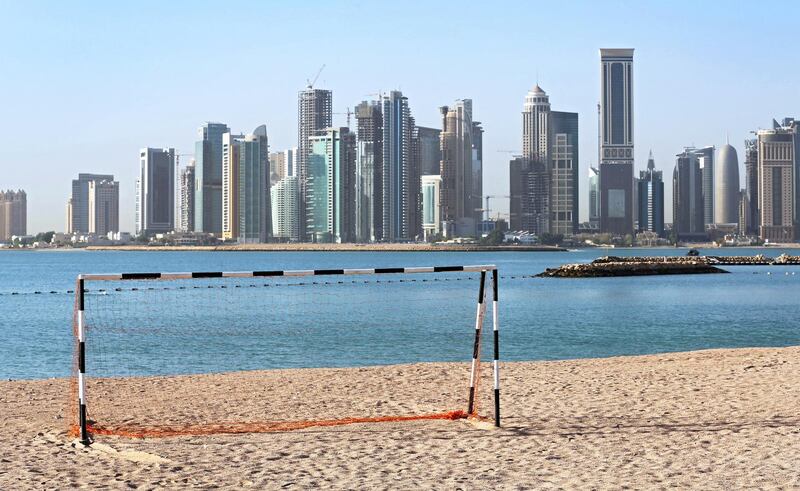Qatar has spent Dh3.3 billion on 40 stadiums in its race to be ready for the 2022 Fifa World Cup but the migrant workers building them are being paid just Dh3.8 an hour, it has been revealed.
More than 1,400 migrants have died since work commenced due to poor conditions and human rights groups forecast the death toll could rise to 4,000 by 2022.
Now, Nepal and the Philippines took united action last week in a bid to protect their citizens against abuses.
It comes after Qatar’s sports minister apologised for the deaths earlier this month.
Chair of the Philippine Commission on Human Rights Chito Gascon said: "Ultimately, there was a commitment on the part of Qatar that they will abide by international labour standards and the only way by which we can ensure that is to surface the issues.
"That's why we need to work very closely with our respective embassies there to make sure that any issues involving labour rights will be quickly addressed by the Qatar government."
Despite mounting international pressure, Qatar’s assurances it was addressing issues of poor living conditions, wages and hazardous working environments have not been matched by action.
An investigation by German broadcaster Westdeutscher Rundfunk Köln (WDR) last month revealed conditions are still substandard with workers living without money or food, in cramped spaces and prison-like conditions.
In a video, Nepali migrants reveal they have not been paid for over six months, have had their passports confiscated and are without food and shelter.
One of the Nepali workers interviewed in the film, Dil Prasad, said: “Every day, we only eat bread and drink water; without money, we can’t afford anything else. Month after month, our situation is getting worse.
“I can’t do it anymore. I just want to go home. I can’t even call my family in Nepal. If only the company would pay us the money we deserve.”
Qatar's kafala sponsorship system has given construction agencies recruiting migrants control over many aspects of workers' lives, including the power to stop them leaving the country.
Over 18 months ago, Qatar signed up to an international agreement to introduce reforms including a minimum wage, allowing people to leave the country and health and safety measures. Evidence suggests the agreement is not being enforced.
The country’s sports minister admitted this month he did not know when wages would be increased.
Speaking in Paris earlier this month at Fifa’s ruling council, Hassan Al Thawadi, Qatar’s Secretary General of the Supreme Committee for Delivery and Legacy, said: “There’s no doubt that every death is a tragedy, it’s as simple as that.
“While progress has been made in the state of Qatar there is still a long way to go.
“We are working very hard with [non-governmental organisations], medical institutions, trade unions and universities to do everything we can to address these issues.
“I can’t speak on the time [it has taken], I can speak about the progress that has been made. As I said, in relation to death, no matter what we say, it’s never going to be enough. But we are doing everything we can and we are making sure that whatever solutions we put in, aren’t just solutions for while we’re under the spotlight but solutions that remain beyond 2022.”
Qatar has a migrant labour force of over 2 million, accounting for 95 per cent of its total labour force. Some 30,000 migrants are involved in its stadium projects
In its latest report into conditions,Qatar revealed there have also been a number of non-work-related deaths among young migrant men in the last year.
Nicholas McGeehan, an expert on workers' rights in the Middle East, told the The Independent newspaper: "These deaths are from only the Supreme Committee's World Cup workers, a tiny proportion of the Qatar migrant workforce.
“It is unsafe to work in those conditions without very substantial safeguards, and the Qataris should have independently investigated the health risks and put those protections in place.”
The Nepalese government says 1,426 of its migrant workers have died in Qatar since the Gulf state was awarded the World Cup in 2010.
There are over 400,000 Nepali and 260,000 Filipino migrant workers in Qatar.
On Thursday, the Philippine Commission on Human Rights and Nepal's National Human Rights Commission vowed to cooperate to protect migrant workers' rights.
Currently unpaid migrant workers in Qatar are forced to lodge claims with the country’s Department of Labour.
Barun Ghimire, a Nepal-based human rights activist and lawyer, said a lack of transparency is allowing subcontractors to escape accountability.
A number of bereaved families claim they have not received compensation following the deaths of relatives in Qatar.
"There have been reports that many Nepali workers have died either in the construction of stadiums or something related to stadiums in Qatar," Mr Ghimire told Arab News.
“We tried to establish a case against employers, but they are difficult to investigate because of the chain [of] brokers involved in recruiting the workers.
“I have also found that there is no proper documentation for Nepali workers. As a result, it’s not easy to establish the culpability of the company. It is difficult to establish the accountability of the companies involved in the preparation of the Fifa World Cup. A lack of transparency in the recruitment process allows companies to escape litigation.”
Qatar’s Supreme Committee for Delivery and Legacy has committed to building seven new stadiums in Qatar, improving three others and has built a further 28 in the Middle East and Asia as part of its Generation Amazing initiative to promote grassroots talent.







